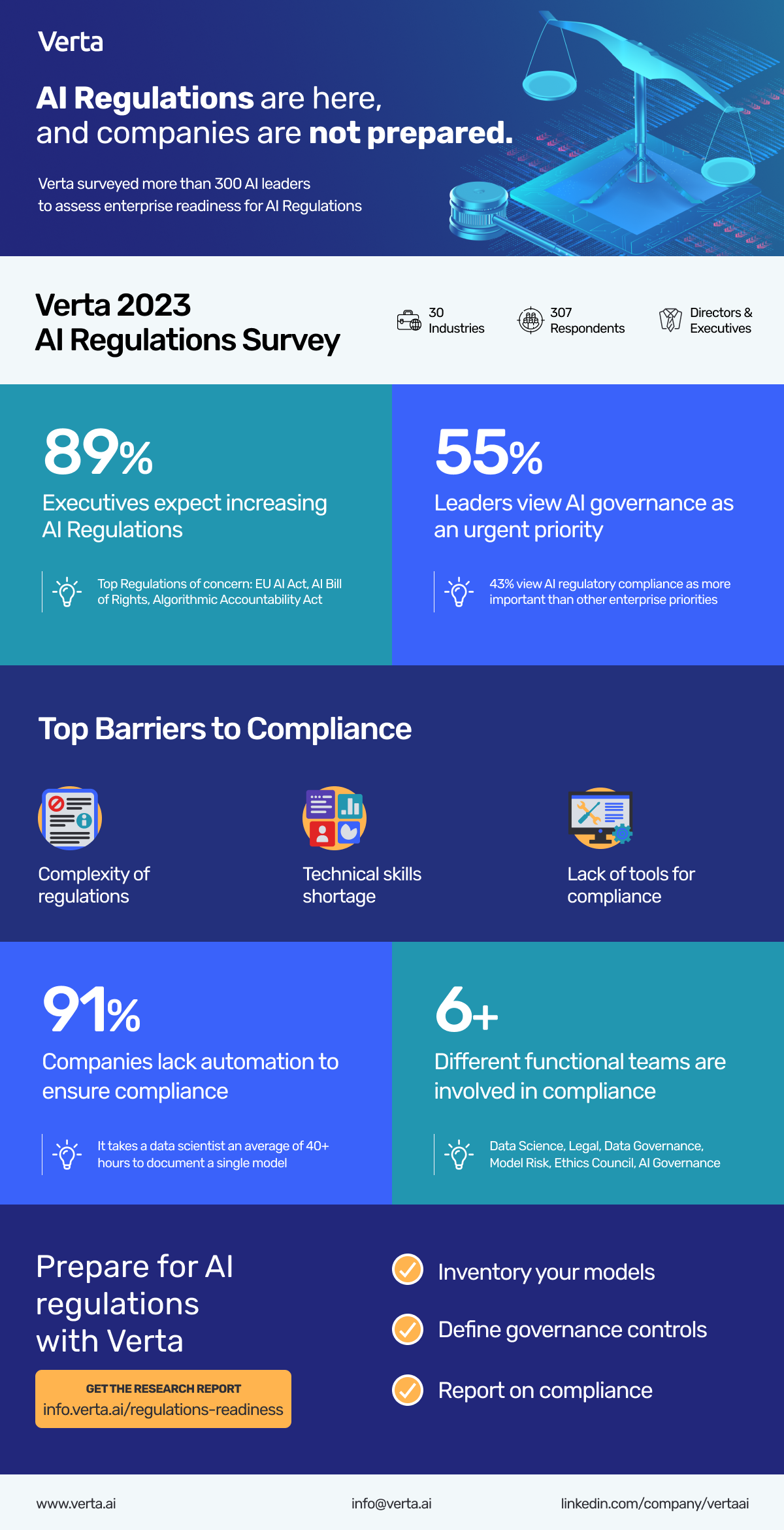Verta surveyed more than 300 AI executive leaders across 30 different industry sectors in Q2 2023 to assess enterprise readiness for AI regulations. The findings suggest that most companies are not prepared to meet the requirements embedded in current and pending AI regulations.
See below for the 5 key takeaways from our survey. Download the full survey results here.

Takeaway 1: 89% of executives expect increasing AI regulations
Public concerns over privacy issues and new AI apps like ChatGPT are spurring more regulation. Dozens of regulations have been introduced in the past 18 months, and top-of-mind regulations for AI leaders include EU AI Act, the AI Bill of Rights, and the Algorithmic Accountability Act, in addition to data privacy regulations like the EU’s GDPR, the Illinois Biometric Information Privacy Act, and the UK Data Protection and Digital Information Bill.
Takeaway 2: AI governance has become an urgent priority
Increasing AI regulations and the expected ratification of the EU AI Act in late 2023 are raising alarm bells in C-suites and board rooms as leaders assess the impacts of new requirements on their AI projects. 55% of leaders surveyed viewed AI compliance as an urgent priority, and 43% of executives viewed regulatory compliance as more important than other enterprise priorities.
Takeaway 3: Top Barriers to Compliance are Complex Laws, Staff and Tools
Top barriers to compliance cited by our study participants include the complexity of regulations, a shortage of technical staff with the skills necessary to ensure compliance, and the fact that many organizations do not yet have tooling in place to ensure compliance. Given the complexity of AI systems, it is unsurprising that the regulations are equally complex; however, the ad hoc nature of AI development and fragmented tooling will make compliance particularly challenging.
Takeaway 4: 91% of companies lack the necessary automation to ensure compliance
The overwhelming majority of organizations have little or no automation in place for the governance or documentation that they will need to rely on to ensure regulatory compliance. Where governance practices exist, they are manual, with many cross-functional handoffs and slowdowns resulting from a lack of centralized tooling. For example, model documentation is a largely manual process currently, and research shows that it takes a data scientist 40+ hours to document a single model or model version.
Takeaway 5: AI Regulatory Compliance is a Multi-stakeholder Initiative
AI/ML is highly multidisciplinary, with multiple roles and teams involved throughout the ML lifecycle, which complicates regulatory compliance. As a result, unsurprisingly, our survey found that on average 6+ teams are involved in compliance, including Data Science, Legal, Data Governance, Model Risk Management, Ethics Councils and AI Governance. The multi-stakeholder nature of AI Compliance will mean additional overhead compared to areas such as Data Governance.
Now is the time to prepare for AI regulations
Steps that companies should be taking today to prepare for compliance include inventorying their models, defining governance controls, and putting in place the processes and tools necessary to report on compliance.
Verta currently is engaged with companies with various levels of maturity around AI governance and is actively assisting our customers in preparing for AI regulations. Reach out to us at info@verta.ai or Schedule a Consultation if you’re interested in discussing how your organization can prepare for current and future regulatory requirements.
Access the full results of the study at here.
Subscribe To Our Blog
Get the latest from Verta delivered directly to you email.



